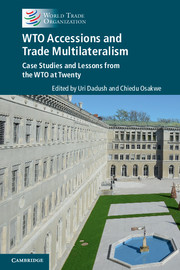Book contents
- Frontmatter
- Dedication
- Contents
- List of contributors
- Foreword
- Acknowledgements
- List of abbreviations
- Editors' note
- PART I WTO accessions, the trading system and the global economy
- PART II Overview: systemic outcomes from accessions
- PART III Members’ perspectives on accession negotiations
- PART IV Working party chairpersons’ perspectives on accession negotiations
- PART V Salient features inWTOAccession Protocols
- 29 Market access goods negotiations: salience, results and meaning
- 30 Services market opening: salience, results and meaning
- 31 WTO accession and the private sector: the nexus of rules and market opportunities
- 32 WTO accession and accession to the Agreement on Government Procurement: what is the relationship? Why should WTO acceding governments also consider GPA accession?
- 33 Energy-related rules in Accession Protocols: where are they?
- 34 Domestic framework for making and enforcing policies
- 35 Export duty commitments: the treaty dialogue and the pattern of commitments
- 36 Disciplining state trading practices: lessons from WTO accession negotiations
- 37 Intellectual property rights protection: the plus/minus debate from a least-developed country perspective – sense and nonsense
- 38 The future of multilateral investment rules in the WTO: contributions from WTO accession outcomes
- 39 Sanitary and phytosanitary measures: trends in accession plurilateral negotiations
- 40 Strengthening transparency in the multilateral trading system: the contribution of the WTO accession process
- PART VI Conclusion
- Annex: Contributor biographies
- Index
- Plate section
- References
38 - The future of multilateral investment rules in the WTO: contributions from WTO accession outcomes
from PART V - Salient features inWTOAccession Protocols
Published online by Cambridge University Press: 05 November 2015
- Frontmatter
- Dedication
- Contents
- List of contributors
- Foreword
- Acknowledgements
- List of abbreviations
- Editors' note
- PART I WTO accessions, the trading system and the global economy
- PART II Overview: systemic outcomes from accessions
- PART III Members’ perspectives on accession negotiations
- PART IV Working party chairpersons’ perspectives on accession negotiations
- PART V Salient features inWTOAccession Protocols
- 29 Market access goods negotiations: salience, results and meaning
- 30 Services market opening: salience, results and meaning
- 31 WTO accession and the private sector: the nexus of rules and market opportunities
- 32 WTO accession and accession to the Agreement on Government Procurement: what is the relationship? Why should WTO acceding governments also consider GPA accession?
- 33 Energy-related rules in Accession Protocols: where are they?
- 34 Domestic framework for making and enforcing policies
- 35 Export duty commitments: the treaty dialogue and the pattern of commitments
- 36 Disciplining state trading practices: lessons from WTO accession negotiations
- 37 Intellectual property rights protection: the plus/minus debate from a least-developed country perspective – sense and nonsense
- 38 The future of multilateral investment rules in the WTO: contributions from WTO accession outcomes
- 39 Sanitary and phytosanitary measures: trends in accession plurilateral negotiations
- 40 Strengthening transparency in the multilateral trading system: the contribution of the WTO accession process
- PART VI Conclusion
- Annex: Contributor biographies
- Index
- Plate section
- References
Summary
ABSTRACT
Foreign direct investment and trade are increasingly interlinked due to the deepening integration of trade and production networks. Today, there is an ever-increasing percentage of imports in a country's production. Responding to this increase, some countries have sought to limit the percentage of imports in their production by requiring that foreign investors use locally produced inputs, as an aspect of implementing priorities in development plans and/or strategic industrial policy. These policies and priorities have also been complicated and exacerbated by protectionism, whereby countries discriminate blatantly in order to promote local industries with policies that grant more favours to local producers and/or products and materials. All these practices impact negatively on international trade by distorting the conditions for fair competition. Although different rules have been developed at an international level to streamline these practices, currently there is no single comprehensive framework to govern them at the multilateral level. Despite this, WTO members, through accessions, have negotiated with acceding governments to refine and improve extant investment-related rules in the WTO. This chapter argues that WTO-specific outcomes, as in deposited Accession Protocols, have contributed to improving significantly the predictability of the investment regulatory laws and policies of Article XII members, reinforcing existing investment-related rules on trade in goods and services, and enhancing the business-friendliness of WTO rules and the relationship with the private sector (including through expanded opportunities for investment), by binding, for example, their status quo policies and rules, and accession-specific obligations codified in domestic law and regulation.
Across the global economy, in countries at all levels of development, there is strong acknowledgement of the vital importance and contribution of trade and investment to the creation of jobs and the promotion of ‘strong, sustainable and balanced growth and development’. Yet, there is no single comprehensive multilateral framework on investment rules at an international level, although there have been several efforts in the past to achieve such an objective. Where should efforts to develop a single multilateral set of rules start? Previous efforts to develop a single comprehensive multilateral framework have resulted in limited gains. Currently, the general rules on investment are based on and dispersed in different instruments: regional trade agreements, bilateral and multilateral investment treaties/agreements and investment disciplines from various international organisations, including the WTO, the World Bank and the Organisation for Economic Co-operation and Development (OECD).
- Type
- Chapter
- Information
- WTO Accessions and Trade MultilateralismCase Studies and Lessons from the WTO at Twenty, pp. 818 - 849Publisher: Cambridge University PressPrint publication year: 2015



